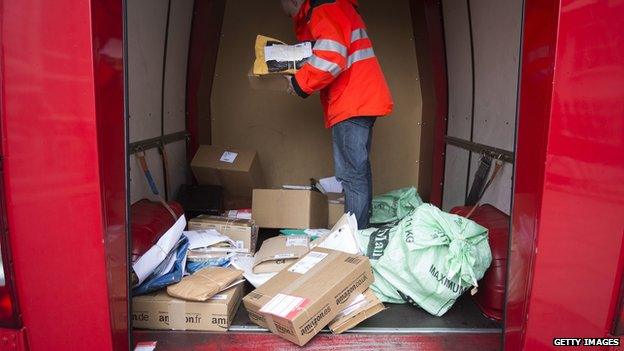Royal Mail in the spotlight on the threat to the universal postal service
- Published
- comments

Blinking into the spotlight, this morning Moya Greene will for the first time appear in public to make the case about why the universal, UK-wide postal service is in imminent danger.
At 9.30am the chief executive of Royal Mail is due before the Business Select Committee in the House of Commons.
If the written evidence Royal Mail has sent to the committee is anything to go by, her words will certainly be punchy.
"Without urgent intervention from Ofcom [the postal regulator], there is a clear and growing threat to the finances of the universal service," that evidence says of the Universal Service Obligation (USO) which orders Royal Mail to deliver letters to every part of the UK, six days a week, for a single price.
And doesn't put the same obligation on competitors.
"A tipping point could be reached. The universal service could become unviable before effective changes can be implemented."
Royal Mail's argument is simple. It claims postal competitors such as TNT Post - now called Whistl - are allowed to cherry pick lucrative urban postal routes, leaving Royal Mail to support the costly rural services.
And that means Royal Mail is finding it increasingly hard to make the requisite profits to support the USO.
Now, many accuse Royal Mail of being engaged in a classic diversionary tactic.
Shout about the USO, and hope what many believe to be the actual cause of the business's problems and the softening share price (the labouring parcels division) will be less visible.
Investors - and that includes hundreds of thousands of individuals who bought shares in the Royal Mail float last year - are concerned about Royal Mail's performance in the highly competitive business of delivering mostly brown packages to workplaces and houses.
.jpg)
In that vital division, revenues are falling despite volumes rising - an uncomfortable position for any business to be in.
At its results last week, Royal Mail blamed Amazon, which has launched its own parcels delivery service. Other private providers - Citilink, UPS and DPD for example - have also eaten into market share.
Of course, Amazon is still one of Royal Mail's largest customers and senior figures close to the online delivery service are certainly slightly bemused that Ms Greene has put the US firm in the frame.
With the online delivery sector still growing, it might appear a slightly odd target.
Ofcom is yet to be convinced that the USO is under threat.
I am told that it is keeping its powder dry until it gives its own evidence to the select committee on 10 December.
Around the same time, it is set to produce a report on the UK postal service, competition and the countrywide obligation.
It is likely that previous scepticism from Ofcom that the USO is truly facing pressure will be repeated.
'Still suffering'
The regulator points out that direct competitors to the Royal Mail still deliver less than 1% of all letters in the UK.
It also says that one of the duties of the regulator is to promote an efficient market to ensure consumers receive the best prices.
Injecting competition is one way of achieving that.
Royal Mail's commercial competitors make similar arguments. They say, for example, that the USO grants Royal Mail exemption from 20% VAT on letters delivery.
Royal Mail insists it is still suffering. It may have a VAT exemption, but, it argues, competitors are gaining higher cost advantages because they are not obliged to offer the same six day level of service.
It also says that where there is direct competition, the market share of the new arrivals can be as high as 14%, well above the 1% national average.
"Market forces - if left unchecked - will naturally work to undermine the universal service," the Royal Mail's evidence says.
The business proposes two solutions to alleviate the threat.
First, it wants to be able to charge different prices around the country for access to its network - which it is mandated to give to competitors via a European Union directive.
It could therefore charge more for delivering the letters and parcels commercial competitors hand on, usually because they are in remoter parts of the country.

Second, Royal Mail wants tougher regulatory rules applied to competitors so that they have to fulfil some of the delivery and collection targets Royal Mail has to achieve, such as a six day service.
That would certainly go some way to levelling out the operational cost differential between the Royal Mail and the rest of the market.
Ofcom says it is keeping a close eye on the situation and will look at a review of the obligation by 2015. The select committee of MPs will also have a view on the strength of Moya Greene's arguments.
Parliament has legislated that the USO must be maintained until at least 2021.
And delivery of letters six days a week for a single price is certainly not going to stop tomorrow.
Ms Greene argues, though, that action must be taken now to guarantee the USO into the future.
MPs will hear her case this morning.
- Published22 July 2014

- Published6 October 2014
